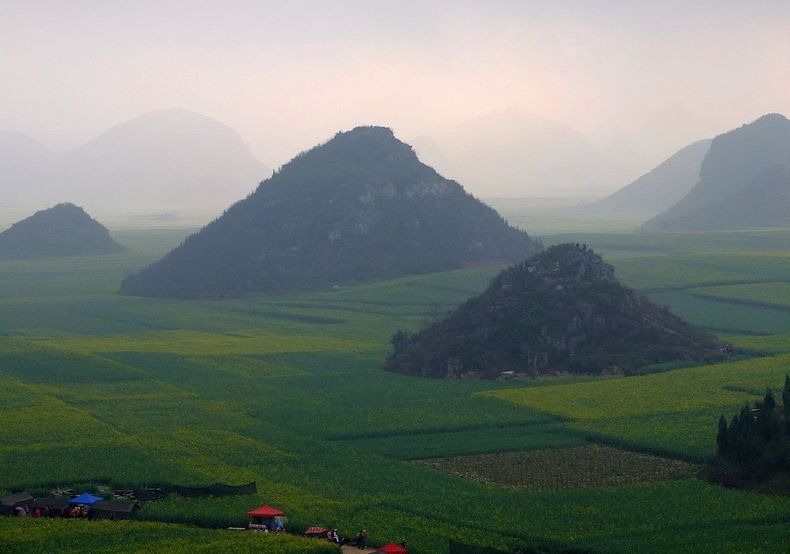Luoping is a small county in eastern Yunnan, China, located about 228 kilometers north east of Kunming close to the border of Yunnan with Guizhou and Guangxi provinces. In early spring, when the yellow rapeseed flowers (also known as canola) are in full bloom, the area takes on the look of a “golden sea” – a spectacle that has made Luoping something of a Mecca for photographers. The sprawling farmlands get covered in golden, yellow rapeseed flowers stretching as far as the eyes can see, all the way to the horizon. The best time to visit Luoping for this visual fiesta is February through March, by June the show is over.
The town was previously overlooked by tourists passing through the area, who usually headed to the more commercialized tourist attractions in the center and eastern part of the province. Today, Luoping’s canola fields attracts photographers from all over, who flock to this small county every early spring to capture the magnificent “sea of yellow” of blooming rapeseed flowers. The majestic photos in turn, draw more and more tourists to this beautiful rural photographic haven.
Aside from photographers, Luoping’s blooming rapeseed flowers and the refreshing smell of spring attract bees. Luoping is a national base for raising bees and producing honey products.
Rapeseed flowers are planted to harvest cooking oil from their seeds after the flowers had withered after their colorful bloom. They are planted all over China but bloom at different times of the year, depending on the temperature of the locations. The rapeseed farms in Luoping are among the largest scale in China.
Spring is also the season for beekeeping and honey processing. Beekeepers set up base in tents amongst the rapeseed farms every spring to keep bees and harvest their honey- the bees feed on the rapeseed flowers. Hence most rapeseed farms are also abuzz with bees in the spring and can be a little irritating. These beekeepers move on to other locations within Luoping after the rapeseed season, using wildflowers as feedstock for their bees.
The most famous spot to view the rapeseeds flower is Jinjifeng (Golden Chicken Peak). It is located only a few kilometers outside of town and is easily accessible by bus. The landscape here is flat, punctuated by a few mounds of little hills, breaking the monotony. The flatness allows the gentle breeze to move the flowers in mesmerizing sways.
Another good place to enjoy the rapeseed fields is Shiwandashan (Hundred Thousand Hills). This rolling hillside of rapeseed farms are located about 15km outside of Luoping town. The farms are all along both sides of the country road, up and down the slopes, dotted with little settlements and hamlets. The view of the farms is backed by rows and rows of mountains in the distance inside the province of Guizhou.
In NiuJie, a few kilometers to the north of Luoping town, the scene takes a different form. Here the flowers are grown in circular rings following the contours of the slopes similar to rice terraces.


Sources: China Trekking, China Backpacker, Wikipedia






























Rapeseed is not used for oil anymore as the oil was so toxic that the FDA banned it for human consumption in 1956.
ReplyDeleteCanadian growers bred a new variety of rapeseed in the 1970s with a lower content of the toxic erucic acid,
The genetically modified version is called "canola" which was coined from "Canadian oil, low acid" to convince consumers that this oil was safe to eat.